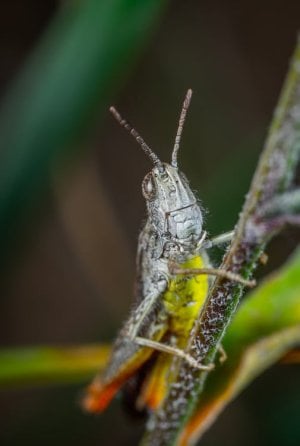What this man found in his burger will make you question your next fast-food order
- Replies 8
Ah, burgers…
Delectable slices of meat sandwiched with tomatoes, lettuce, onions, beetles, and cheese between two buns.
Wait, what?
If you did a double take at the odd ingredient, well, so did the man in this story!
Brendan Prpic was enjoying a large grand Angus burger from his local Macca’s in Leopold, Victoria when he found an insect in his bun.
‘I kindly asked to speak to the manager and she said she had never seen it before,’ he said.
Prpic added he was offered a full refund or a replacement for his purchase, along with a promise that the nasty incident would be looked into.

Despite the offer and assurance, Prpic still has some thoughts on the matter.
‘I’m a bit put off all food now, to be honest,’ he said, indicating that he won’t be visiting Macca’s for a snack anytime soon.
‘Now I’m a bit (suspicious) on how all food is processed, how things are stored.’
A spokesperson for McDonald’s Australia confirmed the incident with Prpic and said he had been compensated.
‘McDonald’s takes food and drink safety extremely seriously,’ the spokesperson said.
‘Our restaurants follow strict cleaning, hygiene, product inspection and preparation processes to ensure the quality of our food.’
‘We have offered the customer a full refund and are working with the restaurant to investigate this further.’
Earlier this week, a KFC customer had a similar discovery when she saw creepy crawlies in her box of chips.
But as much as the idea of having insects anywhere near your food is abhorrent, did you know that they are actually considered to be an emerging food source?
According to the United Nations Food and Agriculture Organisation (UNFAO), edible insects such as crickets, grasshoppers, ants — and yes, beetles — contain high amounts of protein, vitamins, and amino acids essential for humans.

What’s more, the FAO says there is increasing pressure to find more environmentally sustainable food sources as the world is set to have nine billion people by 2050.
All those people need to eat, of course, and so the downstream effects of growing livestock such as supplying the grass cows need to eat and the water they need to drink will be magnified proportionally.
Insects require less to grow and so, they fit the bill quite nicely for what the world needs in the not-so-far future.
Besides, it’s not entirely like eating bugs is a new thing. Indigenous peoples the world over, Australia included, have been feasting on these protein-rich morsels for millennia.
A poll conducted by RMIT University Australia revealed 56.2 per cent of 601 people said they would ‘likely’ eat insects in the future. Eighty-two per cent of people who’ve eaten them before said they’d do it again.
Researchers who conducted the poll stressed that there are as many as 60 insect species known to be traditional food sources for Indigenous Australians, so we really don’t need to look too far for a clue where to start.
With the trade of food products containing insects estimated to be worth ten million dollars in Australia in the next five years, it’s not like there’s a disincentive for businesses as well.
However, it would be remiss of us not to acknowledge the taboo for many that surround eating insects of any kind.

Frankly speaking, it’s why stories like those of Prpic are so perplexing: it’s because the idea of ingesting something that was probably crawling on some nasty surface is inconceivable.
Even if these insects were to be processed before they were served to you, could you honestly say you’d eat them without needing some convincing?
On the other hand, though, the same thing can be said of the things we eat without sparing a thought.
Perhaps at this point, it’s all just a question of gradually acclimating people to see (and eat) insects as viable food sources.
Maybe just not through unexpected cameos in fast food burgers and chips.
So, what do you think of this story? What would you have done in Prpic’s place had you been the one to find a beetle in your burger?
Would you ever be open to eating insects as a source of food?
Tell us what you think below!
Source: YouTube/Bloomberg Quicktake: Explained
Delectable slices of meat sandwiched with tomatoes, lettuce, onions, beetles, and cheese between two buns.
Wait, what?
If you did a double take at the odd ingredient, well, so did the man in this story!
Brendan Prpic was enjoying a large grand Angus burger from his local Macca’s in Leopold, Victoria when he found an insect in his bun.
‘I kindly asked to speak to the manager and she said she had never seen it before,’ he said.
Prpic added he was offered a full refund or a replacement for his purchase, along with a promise that the nasty incident would be looked into.

Prpic ordered a burger at his local Macca’s, but it had an undesirable extra ingredient. Image Credit: McDonald’s Australia
Despite the offer and assurance, Prpic still has some thoughts on the matter.
‘I’m a bit put off all food now, to be honest,’ he said, indicating that he won’t be visiting Macca’s for a snack anytime soon.
‘Now I’m a bit (suspicious) on how all food is processed, how things are stored.’
A spokesperson for McDonald’s Australia confirmed the incident with Prpic and said he had been compensated.
‘McDonald’s takes food and drink safety extremely seriously,’ the spokesperson said.
‘Our restaurants follow strict cleaning, hygiene, product inspection and preparation processes to ensure the quality of our food.’
‘We have offered the customer a full refund and are working with the restaurant to investigate this further.’
Earlier this week, a KFC customer had a similar discovery when she saw creepy crawlies in her box of chips.
But as much as the idea of having insects anywhere near your food is abhorrent, did you know that they are actually considered to be an emerging food source?
According to the United Nations Food and Agriculture Organisation (UNFAO), edible insects such as crickets, grasshoppers, ants — and yes, beetles — contain high amounts of protein, vitamins, and amino acids essential for humans.

Grasshoppers are one of the more commonly eaten insects in the world, according to National Geographic. Stock Image Credit: Pexels/Egor Kamelev
What’s more, the FAO says there is increasing pressure to find more environmentally sustainable food sources as the world is set to have nine billion people by 2050.
All those people need to eat, of course, and so the downstream effects of growing livestock such as supplying the grass cows need to eat and the water they need to drink will be magnified proportionally.
Insects require less to grow and so, they fit the bill quite nicely for what the world needs in the not-so-far future.
Besides, it’s not entirely like eating bugs is a new thing. Indigenous peoples the world over, Australia included, have been feasting on these protein-rich morsels for millennia.
A poll conducted by RMIT University Australia revealed 56.2 per cent of 601 people said they would ‘likely’ eat insects in the future. Eighty-two per cent of people who’ve eaten them before said they’d do it again.
Researchers who conducted the poll stressed that there are as many as 60 insect species known to be traditional food sources for Indigenous Australians, so we really don’t need to look too far for a clue where to start.
With the trade of food products containing insects estimated to be worth ten million dollars in Australia in the next five years, it’s not like there’s a disincentive for businesses as well.
However, it would be remiss of us not to acknowledge the taboo for many that surround eating insects of any kind.

A ballooning population is exerting pressure on the world to provide more food than it can sustain. Stock Image Credit: Pexels/Vlad Alexandru Popa
Frankly speaking, it’s why stories like those of Prpic are so perplexing: it’s because the idea of ingesting something that was probably crawling on some nasty surface is inconceivable.
Even if these insects were to be processed before they were served to you, could you honestly say you’d eat them without needing some convincing?
On the other hand, though, the same thing can be said of the things we eat without sparing a thought.
Perhaps at this point, it’s all just a question of gradually acclimating people to see (and eat) insects as viable food sources.
Maybe just not through unexpected cameos in fast food burgers and chips.
So, what do you think of this story? What would you have done in Prpic’s place had you been the one to find a beetle in your burger?
Would you ever be open to eating insects as a source of food?
Tell us what you think below!
Source: YouTube/Bloomberg Quicktake: Explained







